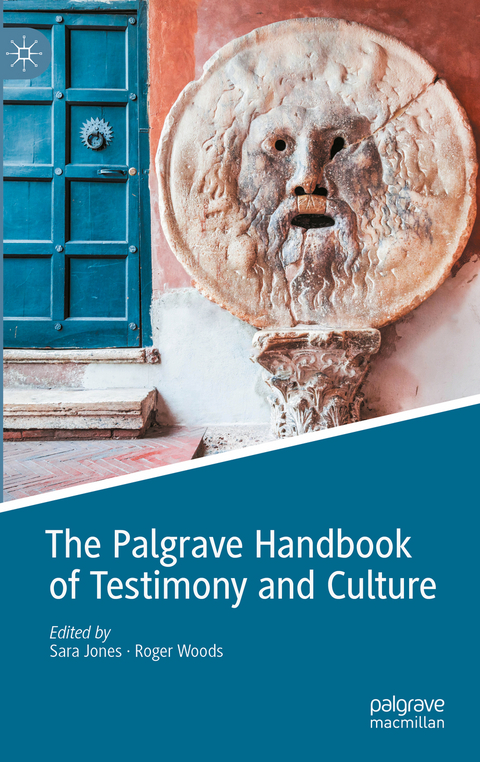
The Palgrave Handbook of Testimony and Culture
Springer International Publishing (Verlag)
978-3-031-13796-9 (ISBN)
This Palgrave Handbook examines the ways in which researchers and practitioners theorise, analyse, produce and make use of testimony. It explores the full range of testimony in the public sphere, including perpetrator testimony, testimony presented through social media and virtual reality. A growing body of research shows how complex and multi-layered testimony can be, how much this complexity adds to our understanding of our past, and how creators and users of testimony have their own complex purposes. These advances indicate that many of our existing assumptions about testimony and models for working with it need to be revisited. The purpose of this Palgrave Handbook is to do just that by bringing together a wide range of disciplinary, theoretical, methodological, and practice-based perspectives.
Sara Jones is Professor of Modern Languages at the University of Birmingham, UK. Her previous books include Complicity, Censorship and Criticism: Negotiating Space in the GDR Literary Sphere (2011); The Media of Testimony: Remembering the East German Stasi in the Berlin Republic (Palgrave, 2014); and Towards a Collaborative Memory: German Memory Work in a Transnational Context (2022).
Roger Woods is Emeritus Professor of German at the University of Nottingham, UK. He is co-editor of German Life Writing in the Twentieth Century (2010) and author of Germany's New Right as Culture and Politics (Palgrave, 2007); Nation ohne Selbtbewußtsein (2001); and The Conservative Revolution in the Weimar Republic (Macmillan, 1996).
1. Introduction: Testimony in Culture and Cultures of Testimony; Sara Jones and Roger Woods.- Concepts in Testimony.- 2. Bearing Witness as Truth Practice: The Twofold - Discursive and Existential - Character of Telling Truth in Testimony; Sybille Krämer.- 3. Bearing Witness as a Boundary Case: Survivor Testimony, Legal Testimony and Historical Testimony; Sigrid Weigel.- 4. Testimonies in Historiography and Oral History; Achim Saupe and Helen Roche.- 5. Gendered Testimonies at the Dawn of the Twenty-First Century; Olga Michael.- 6. Queer Dignity: Intersections of Testimonial Queerness in Theatre, Performance, and the Visual Arts; Isaias Fanlo.- 7. The Cultural Contexts of Testimony: The WEIRDness of Global Cosmopolitan Norms; Sara Jones and Mark A. Wolfgram.- Mediations and Methodologies.- 8. Autobiography as Testimony; Katherine Stone and Roger Woods.- 9. Fictionalisation of Testimony; Carmen-Francesca Banciu, Alexandra Effe, and Melissa Schuh.- 10. Testimony and Film; Mónica Jato.- 11. Filming Interviews with Witnesses to Genocide; Rémy Besson.- 12. The Sensual Memory of Shoah. The Meaning of Sound, Touch and Taste in the Culture of Testimonies; Éva Kovács.- 13. Digital Testimony and Social Media; Ana Belén Martínez García and Christian Karner.- 14. Distributed Remembering: Virtual Reality Testimonies and Immersive Witnessing; Silke Arnold-de Simine and Eugene Ch'ng.- 15. Digital Archiving and Teaching with German-language Testimony on the Holocaust in the Twenty-First Century - A German and Transnational Perspective; Christina Brüning, Verena Nägel, Sanna Stegmaier.- The Ethics and Practice of Testimony.- 16. Testimony, Memorialisation, and Museums: A Crisis in Holocaust Education?; Claudia Reese and Louise Stafford.- 17. Testimony in Public Commemoration and Education for the United Kingdom's Holocaust Memorial Day; Rachel Century, Isabel Wollaston, Alex Blake.- 18. Testifying to Genocide: A Creative and Critical Use of Memory and Testimony in Holocaust Education in the UK and Canada; Fransiska Louwagie, Caroline Sharples, Charlotte Schallié, Andrea Web.- 19. Bearing Witness: Testimony and Transitional Justice in the Aftermath of Mass Violence; Stephen Cody and Eric Stover.- 20. Culture Clash: Doing Justice and Bearing Witness in the Testimonial Process at War Crimes Tribunals; Helena Vranov Schoorl, Sara Rubert, Kimi Lynn King, James David Meernik.- 21. The Rhetoric of Witnessing: Political Address, Historical Justice, and Commemoration of Traumatic Events; Bradford Vivian and Stephanie Arel.- 22. Community Education Projects Giving Voice: The Use of Testimony to Facilitate Understanding in Pursuit of Justice and Sustainable Peace in a Society Emerging from Conflict; Jim Keys, Stephen Gargan, Alan McCully.- 23. Testimony on Whose Terms? The Cultural Politics of Forced Migration Testimony; Hari Reed and Rebecca Hayes Laughton.- 24. Perpetrator Testimony; Ute Hirsekorn and Sue Vice.-25. Testimonies of the Self and Others: Sara Jones and Emilie Pine in Dialogue; Sara Jones and Emilie Pine.
"Essays in this collection will feature on undergraduate reading lists in Cultural Studies, Modern Languages and History courses ... for a long time to come. ... This collection is a fascinating and interesting addition to the literature that needs to be explored and studied by a broad range of scholars, practitioners, and policymakers - anyone, in short, who may need to think critically and creatively about testimony." (Jaime Ashworth, Historical Dialogues, Justice, and Memory Network, historicaldialogues.org, May 5, 2024)
| Erscheinungsdatum | 23.04.2024 |
|---|---|
| Zusatzinfo | XXV, 630 p. 15 illus., 12 illus. in color. |
| Verlagsort | Cham |
| Sprache | englisch |
| Maße | 155 x 235 mm |
| Themenwelt | Geschichte ► Teilgebiete der Geschichte ► Kulturgeschichte |
| Schlagworte | Genocide • memorialisation • Memory • perpetrators • Trauma • truth commissions • War Crimes • witnessing |
| ISBN-10 | 3-031-13796-5 / 3031137965 |
| ISBN-13 | 978-3-031-13796-9 / 9783031137969 |
| Zustand | Neuware |
| Haben Sie eine Frage zum Produkt? |
aus dem Bereich


